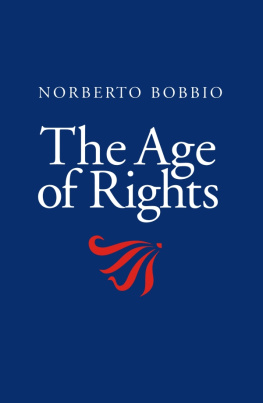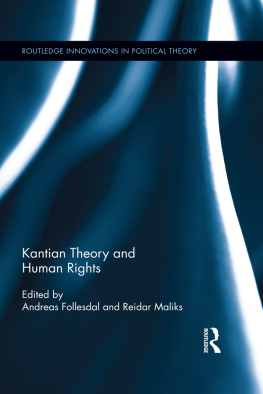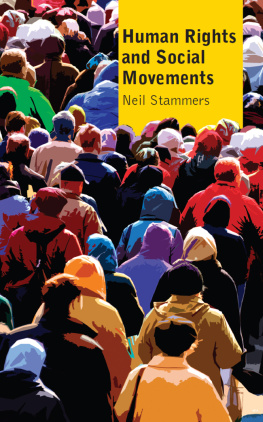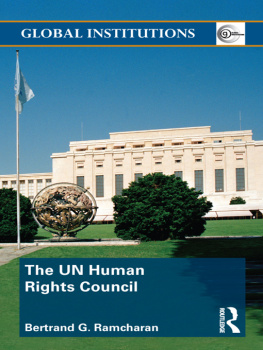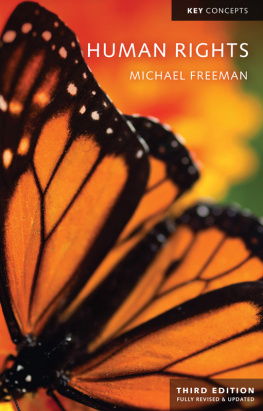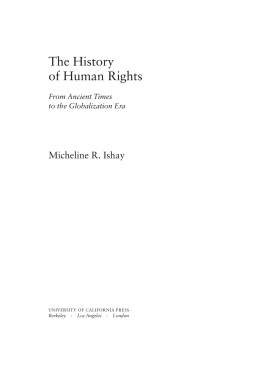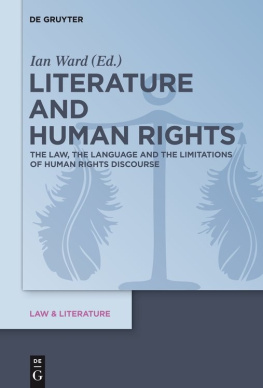
THE AGE OF RIGHTS
NORBERTO BOBBIO
Translated by Allan Cameron
English translation Polity Press 1996
First published in Italy as Let dei diritti Guilio Einaudi 1990
This translation first published in 1996 by Polity Press in association with Blackwell Publishers Ltd.
Reprinted 2005
Polity Press
65 Bridge Street
Cambridge CB2 1 UR, UK
Polity Press
350 Main Street
Malden, MA 02148, USA
All rights reserved. Except for the quotation of short passages for the purposes of criticism and review, no part of this publication may be reproduced, stored in a retrieval system, or transmitted, in any form or by any means, electronic, mechanical, photocopying, recording or otherwise, without the prior permission of the publisher.
Except in the United States of America, this book is sold subject to the condition that it shall not, by way of trade or otherwise, be lent, re-sold, hired out, or otherwise circulated without the publishers prior consent in any form of binding or cover other than that in which it is published and without a similar condition including this condition being imposed on the subsequent purchaser.
ISBN 0-7456-13845
ISBN 0-7456-15953 (pbk)
A CIP catalogue record for this book is available from the British Library and the Library of Congress.
For further information on Polity, visit our website: www.polity.co.uk
Table of Contents
Guide
Pages
Preface to the English Edition
I compiled this collection of articles on human rights on the suggestion and with the assistance of Luigi Bonanate and Michelangelo Bovero. I have written on this subject over a period of many years, and believe these to be the most important of my essays. The whole question is closely related to the issues of peace and democracy, to which I have devoted the bulk of my political writings. The recognition and protection of human rights are the foundations of modern democratic constitutions. Peace is, in turn, the precondition for the recognition and effective protection of human rights within individual states and within the international system. Equally, the democratization of the international system, which is the only way to achieve the ideal of perpetual peace in the sense that Kant attributed to the expression, cannot move ahead without the gradual extension of this recognition and protection of human rights at a supranational level. Human rights, democracy and peace are the three essential components of the same historic movement: if human rights are not recognized and protected, there is no democracy, and without democracy, the minimal conditions for a peaceful resolution of conflicts do not exist. In other words, democracy is a society of citizens, and subjects become citizens when they are recognized as having certain fundamental rights. There will be stable peace, a peace which does not have war as its alternative, only when there are citizens not of this or that particular state, but of the world.
I first wrote on this subject in 1951, following a lecture on the Universal Declaration of Human Rights held in Turin on 4 May, at the invitation of the officers training school. On rereading it after all these years, I find that it contains, albeit in outline only, three theories which I have always continued to hold:
- Natural rights are historic rights.
- They came into existence at the beginning of the modern era, together with an individualistic perception of society.
- They are one of the principal indicators of progress.
The first essay in this collection was one of the introductory lectures to a conference discussing the foundations of human rights held in LAquila in September 1964, and organized by the International Institute of Philosophy under the chairmanship of Guido Calogero (the other lecture was given by Perelman). The essay confirmed and analysed the historicist theory, which is my basis for disputing not only the legitimacy but also the practicality of the quest for an absolute principle.
This is followed by Human Rights Now and in the Future, the text for a lecture I gave in Turin in December of 1967 for the national conference on human rights held by the Societ ltaliana per lOrganizzazione Internazionale, on the twentieth anniversary of the Universal Declaration. Here, I illustrate the major developments in the history of human rights, from their proclamation to their implementation, and from their implementation within individual states to their implementation within the international system, a process which has only just begun. I then take up the historicist theme, and base my argument on the further expansion of human rights.
The third essay, The Age of Rights, which gives its title to the whole collection, is a speech which I gave under another title at the University of Madrid in September 1987, at the invitation of Professor Gregorio Peces-Barba Martinez, the director of the Instituto de Derechos Humanos in Madrid. As on previous occasions, I take up the historical and also the philosophical significance of the reversal of the relationship between the state and the citizen, which typifies the formation of the modern state. The emphasis has moved from the duties incumbent on a subject to the rights a citizen can demand. Politics are no longer viewed primarily from the sovereigns point of view, but more from that of the citizen, which reflects the success of the individualistic concept of society over the traditional perception of it as an organic whole. For the first time, I demonstrated how the expansion of human rights occurred, moving from an abstraction of the individual, through a gradual differentiation, recognition and protection of needs and interests, to a more concrete concept.
I presented a further and for the moment final reformulation of the historicist arguments in my next essay Human Rights and Society, which I wrote as an introductory report for the international conference on The Sociology of Rights, held in Bologna at the end of May 1988. It discusses some general problems on the theory and history of human rights. I devote a few pages to the anguished theoretical debate on the concept of law applied to human rights, and then return to it a little later in the book.
These writings discuss problems which are both historical and theoretical. I argue that historically the affirmation of human rights derives from a radical inversion of the political relationship between the state and the citizen, or the sovereign and the subject. This relationship is increasingly seen in terms of the rights of citizens who are no longer merely subjects, while the sovereigns powers decline in line with a more individualistic concept of society. According to this new perception, in order to understand society one has to start from its base and the individuals that make it up. This runs counter to the traditional organic concept of society as a whole which takes priority over its individual members. The inverted perspective was principally induced by the religious wars at the beginning of the modern era, and has since become an irreversible process. That experience gave rise to the right to resist oppression, which presupposes a primary and more substantial right: the right of each individual not to be oppressed and to enjoy a few fundamental liberties. These liberties are fundamental because they are natural, and they are natural because they do not depend on the consent of the sovereign. The most fundamental of all these liberties is religious freedom.
This reversal is closely connected to the affirmation of what I have defined as the natural law model, as opposed to its eternal adversary, the Aristotelian model, which is always reappearing and has never quite been defeated. Although there have been many setbacks, the individualistic concept of society has made slow but steady progress from the recognition of a citizens rights within a single state to the recognition of a citizens rights within the world, as was first announced in the Universal Declaration of Human Rights. The question has moved from the realm of each states individual law, through laws established between states, towards a cosmopolitan right, to use Kants expression (his contribution to legal theory has not yet been fully recognized).
Next page
